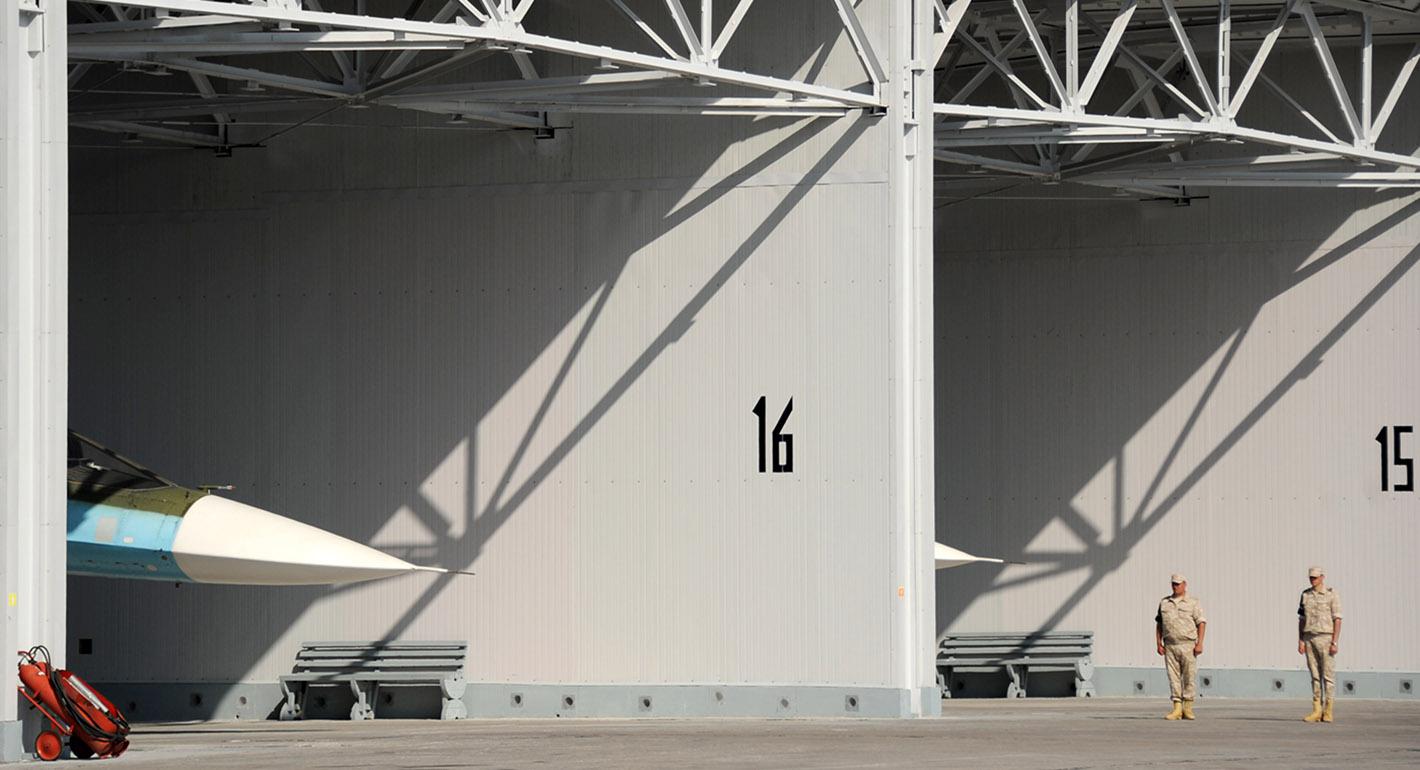The main source of Russian aggression is a profound mistrust of the West and the firm belief that it intends to inflict a “strategic defeat” on Russia. As long as this fear persists, the war will not end.
Tatiana Stanovaya
{
"authors": [
"Nikita Smagin"
],
"type": "commentary",
"blog": "Carnegie Politika",
"centerAffiliationAll": "dc",
"centers": [
"Carnegie Endowment for International Peace",
"Carnegie Russia Eurasia Center"
],
"collections": [],
"englishNewsletterAll": "",
"nonEnglishNewsletterAll": "",
"primaryCenter": "Carnegie Russia Eurasia Center",
"programAffiliation": "russia",
"programs": [
"Russia and Eurasia"
],
"projects": [],
"regions": [
"Middle East",
"Syria",
"Russia",
"Iran",
"Türkiye",
"Caucasus"
],
"topics": [
"Security",
"Military",
"Foreign Policy",
"Economy"
]
}
Source: Getty
Russia has no plans to leave Syria, but is increasingly unwilling to intervene in the country’s domestic affairs, whether militarily or financially.
The Russian invasion of Ukraine has completely eclipsed Russia’s other military operation: Syria. It’s not just television coverage that has been diverted from the Middle East to Ukraine, but Russian troops and resources, too.
In recent months, Russia has reduced the number of its troops in Syria, ceded control over territory, and reduced humanitarian aid. That’s not to say, however, that it is leaving the country. Moscow still considers its presence in Syria a valuable asset, and sees its alliance with Damascus as an important bargaining chip in talks with the West.
The war in Ukraine has rapidly depleted Russia’s resources, causing it to seek additional reserves, and Syria is one of the most obvious sources of military personnel with real combat experience. Soon after the start of the invasion, a squadron of Su-25 fighter planes was redeployed to Russia. In August, an S-300 long-range missile system was reportedly shipped to the Crimea from the Syrian port of Tartus.
In addition, the Russian military has withdrawn from some areas of Latakia, which were promptly reoccupied by pro-Iranian Hezbollah fighters. Experienced Russian troops are gradually being transferred to Ukraine and being replaced in Syria by rookie soldiers.
At the same time, reports of a sharp decrease in Russia’s military presence in Syria should be taken with a grain of salt: moving certain detachments to the Ukrainian front has barely reduced Moscow’s strategic capabilities in the region. Russian troops are involved in fewer military operations in Syria now simply because the active phase of the Syrian conflict is over. Still, airstrikes on Syrian territory continue, as do Russia’s joint military exercises with Syrian President Bashar al-Assad’s army.
It would be wrong to overstate the potential of the troops redeployed from Syria to the Ukrainian front. Russia never had a truly sizable contingent in Syria. It didn’t try to replace the country’s armed forces, but merely complemented them and helped with supplies. The approximately 5,000 troops that served in Syria is an insignificant number on the scale of the Ukraine conflict, and in any case, experience gained in the Middle East is only partly applicable on Ukrainian soil.
For Moscow, mired in the Ukraine conflict, an ideal outcome in Syria would be the reconciliation of the warring sides. At the start of this year, Moscow attempted to organize a dialogue between the Syrian foreign minister and his Turkish counterpart, since Turkey may play a decisive role in resolving the Syrian conflict. Ankara has long abandoned the goal of ousting Assad, and some form of dialogue might be advantageous to both sides.
Yet resolving numerous disagreements between the two states will take time. Pro-Turkish militants are still present in Syria, and Turkish troops control some areas of the country. The Turkish presidential election scheduled for May 2023 is also a factor. President Recep Tayyip Erdogan, who has previously used the threat of the Syrian Kurds and military operations in Syria to boost his ratings, may want to do so again.
The confrontation between Iran and Israel is another obstacle to resolving the Syrian conflict. On the one hand, Russia has been trying to reduce tensions; on the other, it has allowed Israel to destroy Iranian and Iranian-backed sites in Syria time and time again. Now, the closer cooperation between Moscow and Tehran as a result of the war in Ukraine has seriously complicated Russia’s balancing act.
Another cause for concern is that Russia has virtually stopped its financial assistance to Syria. Moscow never sought to fully bankroll Damascus, but even last spring, the Russian Foreign Ministry reported delivering 5,500 tons of humanitarian cargo to Syria. Now those resources are being redirected to the newly annexed territories in Ukraine.
The decline in Russian help may exacerbate the situation in Syria, especially since its other benefactor, Iran, has also reduced its aid. Gripped by economic and political crises, Iran will reportedly no longer supply Damascus with cheap oil.
Syria is still subject to international sanctions and has just undergone a devastating earthquake, so without support from its key sponsors, the situation in the country is bound to deteriorate. Social tensions may escalate, and even though Syria’s domestic stability isn’t the most pressing issue for Russia, it’s certainly an additional problem to worry about.
Finally, a comprehensive resolution of the Syrian crisis is impossible without the involvement of the United States, which still has troops deployed there. Those troops are formally allied with Kurdish military units, which both Ankara and Damascus seek to destroy. In this context, it’s unlikely that Washington will take any steps that might strengthen relations between Russia, Iran, and Turkey.
Notwithstanding all the difficulties, for Russia, Syria is a valuable asset that can be used in negotiations with Turkey, Iran, and Israel. In addition, it could be a subject of potential dialogue with the United States, which is especially important given the paucity of discussion topics open to the two countries at this time.
Turkey and Iran, Russia’s main partners in the Syrian dialogue, each gained in significance last year. Ankara is no longer just an important economic partner for Moscow: as an intermediary between Russia and the West, it has become indispensable to the Kremlin in areas far beyond trade.
Iran’s standing has also changed. Russia did have to take the Iranian presence in Syria into account, but its economic importance for Moscow was minimal. The war in Ukraine and ensuing Western sanctions, however, have made Iran a key player in circumventing sanctions. In addition, Tehran is essentially a party to the conflict in Ukraine now due to its kamikaze drone shipments to Russia. In short, Iran is far more important to Russia now than it was before, making it harder for Moscow to put pressure on it.
Other Middle Eastern states—the UAE, Saudi Arabia, and Egypt—may also partner with Russia to beat sanctions. Not overly concerned with human rights issues, Saudi Arabia and Qatar had prior interests in Syria, so they may raise some Syrian issues in their dialogue with Russia, such as the desire to be involved in rebuilding the country or to enter its market.
Accordingly, Russia has no plans to leave Syria. It sees its presence there as an important accomplishment and a bargaining chip in possible dialogue with a variety of partners, from regional powers in the Middle East to Western states. At the same time, Moscow is increasingly unwilling to intervene in Syria’s domestic affairs, whether militarily or financially. Instead, it is focused on convincing the parties not to escalate the situation. After all, Russia is keen to minimize any distractions from Ukraine, the foreign policy priority that is consuming almost all of its resources.
Carnegie does not take institutional positions on public policy issues; the views represented herein are those of the author(s) and do not necessarily reflect the views of Carnegie, its staff, or its trustees.
The main source of Russian aggression is a profound mistrust of the West and the firm belief that it intends to inflict a “strategic defeat” on Russia. As long as this fear persists, the war will not end.

Tatiana Stanovaya
The Russian army is not currently struggling to recruit new contract soldiers, though the number of people willing to go to war for money is dwindling.

Dmitry Kuznets
Insisting on Zelensky’s resignation is not just a personal vendetta, but a clear signal that the Kremlin would like to send to all its neighbors: even if you manage to put up some resistance, you will ultimately pay the price—including on a personal level.

Vladislav Gorin
For Putin, upgrading Russia’s nuclear forces was a secondary goal. The main aim was to gain an advantage over the West, including by strengthening the nuclear threat on all fronts. That made growth in missile arsenals and a new arms race inevitable.

Maxim Starchak
For a real example of political forces engaged in the militarization of society, the Russian leadership might consider looking closer to home.

James D.J. Brown